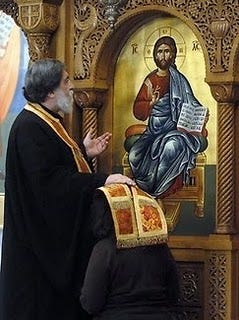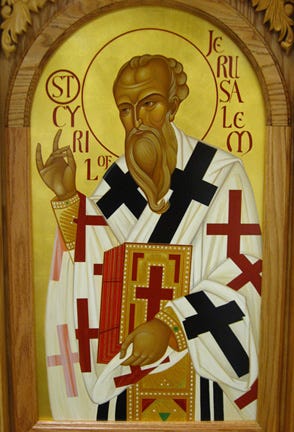“You cannot put straight in others what is warped in yourself.”
St. Athanasius of Alexandria
Isaiah 9:9-10:4
And all the people will know, E’phraim and the inhabitants of Sama’ria, who say in pride and in arrogance of heart: “The bricks have fallen, but we will build with dressed stones; the sycamores have been cut down, but we will put cedars in their place.” So the LORD raises adversaries against them, and stirs up their enemies. The Syrians on the east and the Philistines on the west devour Israel with open mouth. For all this his anger is not turned away and his hand is stretched out still. The people did not turn to him who smote them, nor seek the LORD of hosts. So the LORD cut off from Israel head and tail, palm branch and reed in one day– the elder and honored man is the head, and the prophet who teaches lies is the tail; for those who lead this people lead them astray, and those who are led by them are swallowed up. Therefore the Lord does not rejoice over their young men, and has no compassion on their fatherless and widows; for every one is godless and an evildoer, and every mouth speaks folly. For all this his anger is not turned away and his hand is stretched out still. For wickedness burns like a fire, it consumes briers and thorns; it kindles the thickets of the forest, and they roll upward in a column of smoke. Through the wrath of the LORD of hosts the land is burned, and the people are like fuel for the fire; no man spares his brother. They snatch on the right, but are still hungry, and they devour on the left, but are not satisfied; each devours his neighbor’s flesh, Manas’seh E’phraim, and E’phraim Manas’seh, and together they are against Judah. For all this his anger is not turned away and his hand is stretched out still.
Woe to those who decree iniquitous decrees, and the writers who keep writing oppression, to turn aside the needy from justice and to rob the poor of my people of their right, that widows may be their spoil, and that they may make the fatherless their prey! What will you do on the day of punishment, in the storm which will come from afar? To whom will you flee for help, and where will you leave your wealth? Nothing remains but to crouch among the prisoners or fall among the slain. For all this his anger is not turned away and his hand is stretched out still.
Genesis 7:1-5
Then the LORD said to Noah, “Go into the ark, you and all your household, for I have seen that you are righteous before me in this generation. Take with you seven pairs of all clean animals, the male and his mate; and a pair of the animals that are not clean, the male and his mate; and seven pairs of the birds of the air also, male and female, to keep their kind alive upon the face of all the earth. For in seven days I will send rain upon the earth forty days and forty nights; and every living thing that I have made I will blot out from the face of the ground.” And Noah did all that the LORD had commanded him.
Proverbs 8:32-9:11
And now, my sons, listen to me: happy are those who keep my ways. Hear instruction and be wise, and do not neglect it. Happy is the man who listens to me, watching daily at my gates, waiting beside my doors. For he who finds me finds life and obtains favor from the LORD; but he who misses me injures himself; all who hate me love death.”
Wisdom has built her house, she has set up her seven pillars. She has slaughtered her beasts, she has mixed her wine, she has also set her table. She has sent out her maids to call from the highest places in the town, “Whoever is simple, let him turn in here!” To him who is without sense she says, “Come, eat of my bread and drink of the wine I have mixed. Leave simpleness, and live, and walk in the way of insight.” He who corrects a scoffer gets himself abuse, and he who reproves a wicked man incurs injury. Do not reprove a scoffer, or he will hate you; reprove a wise man, and he will love you. Give instruction to a wise man, and he will be still wiser; teach a righteous man and he will increase in learning. The fear of the LORD is the beginning of wisdom, and the knowledge of the Holy One is insight. For by me your days will be multiplied, and years will be added to your life.
Saint Cyril, Archbishop of Jerusalem
Saint Cyril, Archbishop of Jerusalem, was born in Jerusalem in the year 315 and was raised in strict Christian piety. Upon reaching the age of maturity, he became a monk, and in the year 346 he became a presbyter. In the year 350, upon the death of Archbishop Maximus, he succeeded him on the episcopal throne of Jerusalem.
As Patriarch of Jerusalem, Saint Cyril zealously fought against the heresies of Arius and Macedonius. In so doing, he aroused the animosity of the Arian bishops, who sought to have him deposed and banished from Jerusalem.
There was a miraculous portent in 351 at Jerusalem: at the third hour of the day on the Feast of Pentecost, the Holy Cross appeared in the heavens, shining with a radiant light. It stretched from Golgotha above the Mount of Olives. Saint Cyril reported this portent to the Arian emperor Constantius (351-363), hoping to convert him to Orthodoxy.
The heretic Acacius, deposed by the Council of Sardica, was formerly the Metropolitan of Caesarea, and he collaborated with the emperor to have Saint Cyril removed. An intense famine struck Jerusalem, and Saint Cyril expended all his wealth in charity. But since the famine did not abate, the saint pawned church utensils, and used the money to buy wheat for the starving. The saint’s enemies spread a scandalous rumor that they had seen a woman in the city dancing around in clerical garb. Taking advantage of this rumor, the heretics forcibly expelled the saint.
The saint found shelter with Bishop Silvanus in Tarsus. After this, a local Council was held at Seleucia, at which there were about 150 bishops, and among them Saint Cyril. The heretical Metropolitan Acacius did not want to allow him to take a seat, but the Council would not consent to this. Acacius stormed out of the Council, and before the emperor and the Arian patriarch Eudoxius, he denounced both the Council and Saint Cyril. The emperor had the saint imprisoned.
When the emperor Julian the Apostate (361-363) ascended the throne he repealed all the anti-Orthodox decrees of Constantius, seemingly out of piety. Saint Cyril returned to his own flock. But after a certain while, when Julian had become secure upon the throne, he openly apostasized and renounced Christ. He permitted the Jews to start rebuilding the Temple of Jerusalem that had been destroyed by the Romans, and he even provided them part of the funds for the building from the state treasury.
Saint Cyril predicted that the words of the Savior about the destruction of the Temple down to its very stones (Luke. 21:6) would undoubtedly transpire, and the blasphemous intent of Julian would come to naught. Soon there was such a powerful earthquake, that even the solidly set foundation of the ancient Temple of Solomon shifted in its place, and what had been rebuilt fell down and shattered into dust. When the Jews resumed construction, a fire came down from the heavens and destroyed the tools of the workmen. Great terror seized everyone. On the following night, the Sign of the Cross appeared on the clothing of the Jews, which they could not remove by any means.
After this heavenly confirmation of Saint Cyril’s prediction, they banished him again, and the bishop’s throne was occupied by Saint Cyriacus. But Saint Cyriacus soon suffered a martyr’s death (October 28).
After the emperor Julian perished in 363, Saint Cyril returned to his See, but during the reign of the emperor Valens (364-378) he was exiled for a third time. It was only under the holy emperor Saint Theodosius the Great (379-395) that he finally returned to his archpastoral activity. In 381 Saint Cyril participated in the Second Ecumenical Council, which condemned the heresy of Macedonius and affirmed the Nicea-Constantinople Symbol of Faith (Creed).
Saint Cyril’s works include twenty-three Instructions (Eighteen are Catechetical, intended for those preparing for Baptism, and five are for the newly-baptized) and two discourses on Gospel themes: “On the Paralytic,” and “Concerning the Transformation of Water into Wine at Cana.”
At the heart of the Catechetical Instructions is a detailed explanation of the Symbol of Faith. The saint suggests that a Christian should inscribe the Symbol of Faith upon “the tablets of the heart.”
“The articles of the Faith,” Saint Cyril teaches, “were not written through human cleverness, but they contain everything that is most important in all the Scriptures, in a single teaching of faith. Just as the mustard seed contains all its plethora of branches within its small kernel, so also does the Faith in its several declarations combine all the pious teachings of the Old and the New Testaments.”
Saint Cyril, a great ascetic and a champion of Orthodoxy, died in the year 386.
Erstwhile events
Fr. Andreas Agathokleous
Every person’s history comprises various phases, some pleasant, others not so. When we reflect on them, it may be that we’d rather some of them hadn’t happened and that, if we were able, we’d alter them.
And yet they all contribute to our spiritual development and maturity. They’ve all given us something without which we wouldn’t be who we are and wouldn’t have our own story.
It’s been said that our life resembles a piece of embroidery. Where the confused tangle of threads below prepare the beautiful pattern above. In other words, we can’t at this moment explain various events which look more like ‘a confused tangle of threads’, being without reason or cohesion. In the end, though, it’ll be clear that nothing’s fortuitous and that there’s a point to everything.
It’s true that we’ve not been cast into a boundless universe, alone and without assistance. We have a God and Father who cares about us, who loves us and looks after us, not directing our life but accompanying us on the journey. This experience becomes personal to the point that we experience his presence, and see his love in his unobtrusive interventions.
A God who condescended to become human can’t be understood rationally.
A person who is both God and human and is taken to his death on the cross without offering any resistance, becomes the familiar acquaintance of the humble, the insignificant and the downtrodden.
What can you say about his silence in the face of our cries? How can you explain his scandalous benefactions towards some and his apparent indifference towards others? ‘Who has known the mind of God?’. Who will stand as his lawyer?
So, when we look at the erstwhile events in our life, we can confirm the moments of his living presence, as well as the harsh times of his silence. We can distinguish the beauty of the visitation of God’s grace, as well as the misery of its absence.
The question might be asked? What’s the point of turning back to our past? What benefit is there in raking it up, particularly when it painfully defined our later life? Exactly. As the past, it’s dead and we experience it only as a memory. But it can still affect us negatively if we turn to it with a ‘Why?’, which stifles our freedom and contentment. Just as it can affect us positively, if we leave it permanently in our wake and begin a new life, with a new outlook. In other words, what the Church calls repentance.
The past then, with its pros and cons, becomes the story of each of us, becomes our own. And it’s not all a plus or a minus. With the pleasant, and the unpleasant- which one day will also become pleasant- since these events will have given us experience, wisdom, discernment, and, in particular, repentance as a dynamic way forwards, towards the eternal day when everything shall be made new and beauteous in the light of Christ.
This week’s calendar reminders:
Monday 3/17: Lenten Matins 8:30 am
Tuesday 3/18: no services or events
Wednesday 3/19: Presanctified Liturgy 6:30 pm (potluck meal to follow)
Thursday 3/20: Lenten Matins 8:30 am
Friday 3/21: Paraklesis to the Theotokos 8:30 am
Saturday 3/22: Memorial Liturgy for the Departed 9:15 a.m.; Catechumen Class 4:30 pm; Choir Rehearsal 4:30 pm; Great Vespers 6 pm
Sunday 3/23: Divine Liturgy 9:15am;
CLICK BELOW to donate online:
Christ the Savior Orthodox Church is located in Southbury, Connecticut, and is part of the New England Diocese of the Orthodox Church of America.
Mailing address: Christ the Savior Church, 1070 Roxbury Road, Southbury, CT 06488
PLEASE DONATE to help our parish do the work of the Lord, thrive and grow, and extend the Kingdom of God. May the Lord bless your generosity!
Fr. Moses Locke can be reached at frmoseslocke@gmail.com











